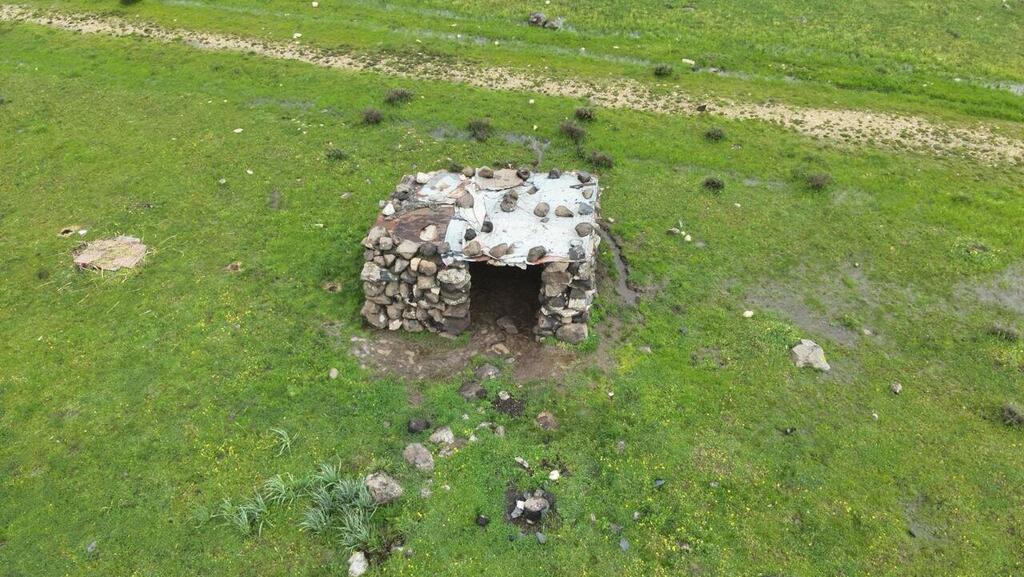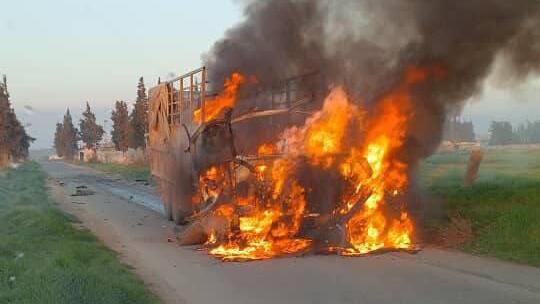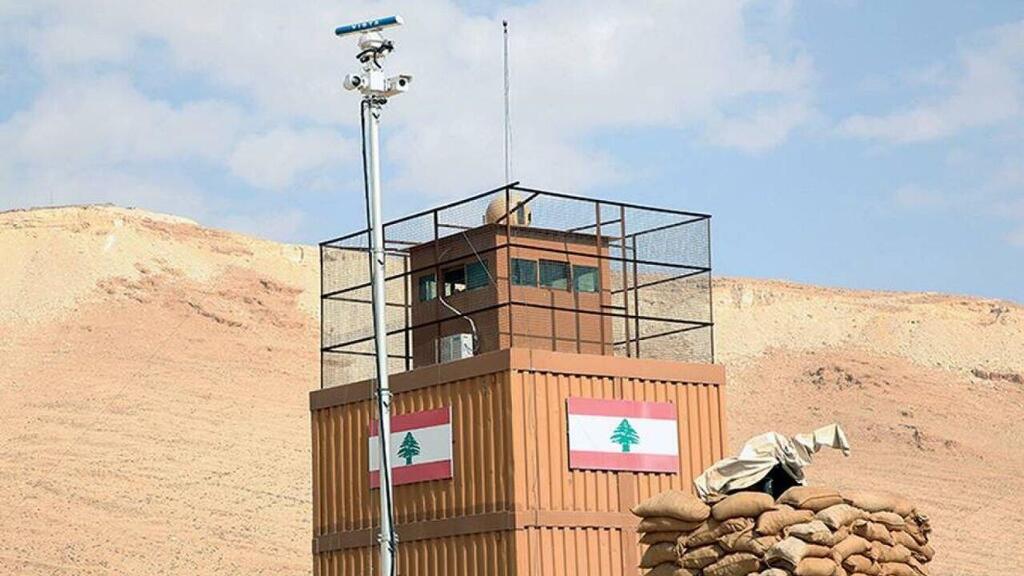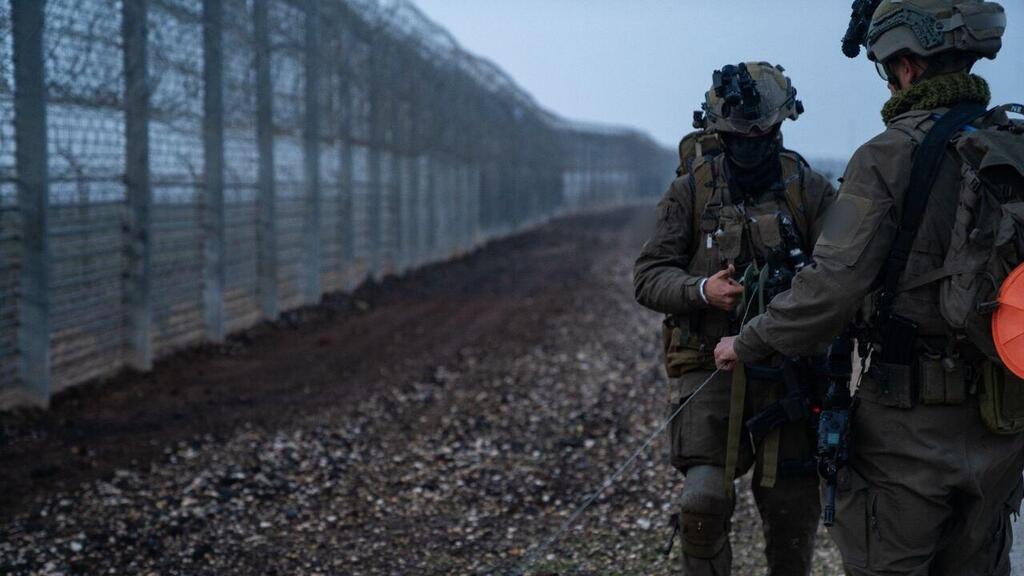Getting your Trinity Audio player ready...
Hezbollah reported Sunday two fatalities from its ranks in an airstrike on the Lebanon-Syria border attributed to Israel. Shortly before, sources in Damascus attributed to Israel another attack in the Homs region near the border between Syria and its neighbor, where the heart of the Shiite terrorist organization is located.
Read more:
Since the outbreak of the war, Hezbollah's activity in the territory under the control of Bashar al-Assad's regime has repeatedly been exposed, but Iranian elements and pro-Iranian militias loyal to the "Axis of Resistance" also operate in the area and enjoy the support of the Tehran regime.
Hassan Nasrallah's organization did not link in its official statements between the deaths of its two operatives and the attack in the area straddling the Syria-Lebanon border. However, the Syrian Observatory For Human Rights, a London-based opposition war monitor, linked all the details that were published. A photo documenting a truck engulfed in flames after the airstrike attributed to Israel was circulated on social media.
Hezbollah operatives are scattered along the southern border of Lebanon as well as in areas bordering Syria. They reside in villages near the border fence and operate when necessary. The presence of Hezbollah in the Al-Biqa'a district in Lebanon, which borders Syria, may provide convenient access to the neighboring country for activities such as arms smuggling and training.
Attack attributed to Israel in Syria
Numerous pro-Iranian militias operate in Syrian territory, some of which have been involved in attacks on U.S. military bases in recent months. According to recent reports on Sky News in Arabic, Hezbollah uses its operations in Syria through military units of the local army and relies on civilian houses in the Sayyidah Zaynab area to establish temporary headquarters that vary from time to time.
According to data from the Syrian Observatory for Human Rights, Israel has carried out 16 attacks in Syria since the beginning of the year, with 10 being aerial and six ground-based. These attacks reportedly damaged or destroyed 34 targets, including key weapon depots and ammunition caches.
Additionally, the opposition watchdog reported that since the beginning of 2024, 35 operatives from various organizations have been killed in Syrian territory: eight of them affiliated with Hezbollah, seven Iranians linked to the Revolutionary Guards and the rest associated with pro-Iranian militias.
The Lebanon-Syria border has made headlines in recent days not only regarding assassinations. According to Arab reports, the Syrian government sent an official memorandum to the Lebanese government regarding surveillance towers spread between the two countries. Syria claims that these towers, erected by the British for the Lebanese army, pose a threat to its national security.
According to Hezbollah-affiliated newspaper Al Akhbar, Damascus alleges that the towers contain intelligence and reconnaissance equipment that could aid in gathering information about Syrian affairs. Damascus indicates that the information collected from these towers reaches not only Britain but also Israel, which, according to them, the IDF uses to conduct operations within Syrian territory. The official memorandum also criticizes the presence of British officers in the towers during a period when London played a negative role vis-à-vis Damascus.
The allegations from Syria were not made in a vacuum. Over the weekend, Al Akhbar reported that discussions are underway regarding the construction of additional towers that will strengthen control in additional areas along the Lebanon-Syria border, extending toward the border area with Israel in the Golan Heights. Earlier this month, a Hezbollah official said that similar towers are also planned for the southern Lebanon-Israel border.
Explosion of makeshift structures near the Syrian border by IDF forces
(Video: IDF Spokesperson's Unit)
According to the weekend report in the Lebanese newspaper, the surveillance towers will be erected five kilometers deep into Lebanon and five kilometers deep into Israel. Additionally, the Hezbollah-affiliated newspaper noted that Israel is unlikely to agree to such a move. Conversely, Western diplomatic sources indicated over the weekend that Israel mocked the proposal.
Beirut has yet to issue an official response to Syria's allegations regarding the letter against the tower activity on the Lebanese border. However, Saudi newspaper Asharq Al Awsat reported on Saturday that the response would include clarification that the towers, which have been operational for over 10 years under Lebanese army management, are not affiliated with any foreign country and greatly assist in reducing smuggling.
Meanwhile, the IDF continues to monitor activities near the Israeli border. In recent weeks, two stone structures were built in Israeli territory in the rugged terrain near the Syrian border. These structures were used for covert observation and surveillance purposes toward Israel.
On Friday morning, forces from the 474th Brigade demolished the structures near Tel Faher in the southern Golan Heights, mere yards from the border fence. This action addressed a clear breach of the border, following close surveillance of infiltrators who crossed the international demarcation line, knowingly entering the country's territory.
"We identified in recent weeks that they were under construction, monitored the building process, gathered all the information and decided not to allow the continuation of this activity once their construction was completed," recounted Major (res.) Nadav, a commander in the 474th Brigade, to Ynet.
4 View gallery


Makeshift structures erected near the Syrian border and destroyed by the IDF
(Photo: IDF Spokesperson's Unit)
"On Friday morning, we breached the fence and detonated both structures with explosives, then left the area. At dawn, we demolished both structures. It's undoubtedly a nefarious act, and any approach of shepherds or civilians to the fence is likely part of a collaboration in the area. These weren't buildings meant for occupancy, but rather structures that could serve the other side for residence and military purposes."
Since the outbreak of the war, the IDF has identified attempts to establish and create a terror front along the Syrian border by organizations dispatched to the Syrian sector, Lebanon, Iran, Iraq, and beyond. Their presence is closely monitored, and military forces study and investigate their activities.








